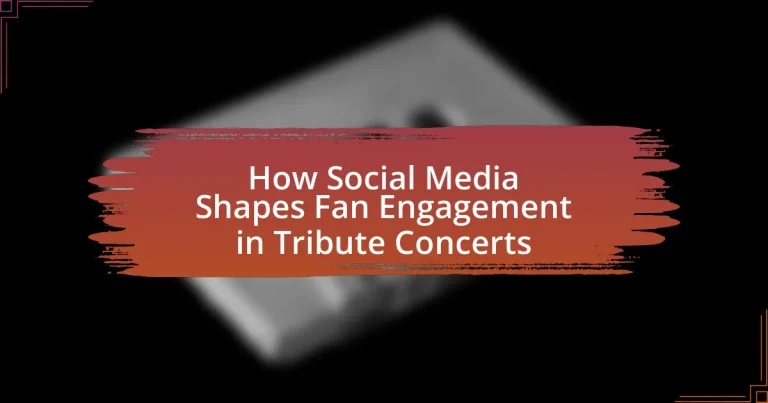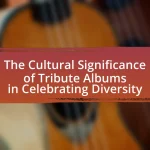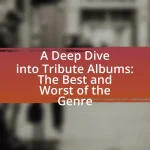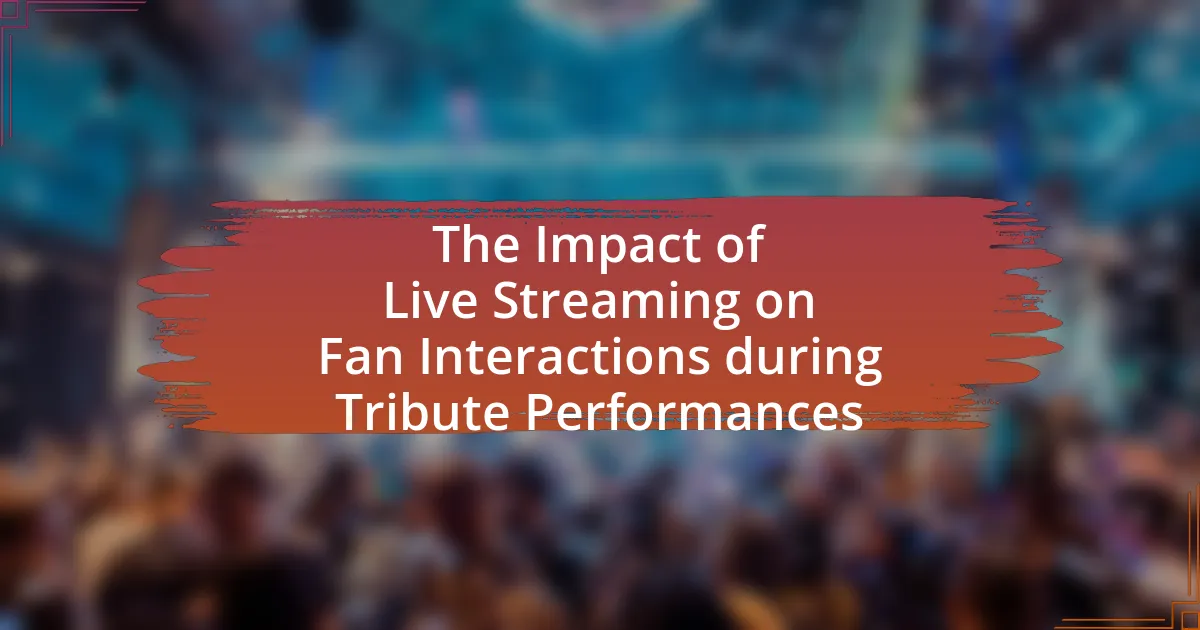The article examines how social media influences fan engagement in tribute concerts, highlighting its role in real-time interaction, community building, and event promotion. It discusses the effectiveness of various platforms, such as Facebook, Twitter, and Instagram, in enhancing visibility and facilitating direct communication between artists and fans. Key strategies for organizers include targeted content marketing, influencer partnerships, and interactive features that foster participation. Additionally, the article addresses challenges like managing audience expectations and misinformation, while emphasizing the importance of leveraging social media data to improve future events and enhance overall fan experiences.
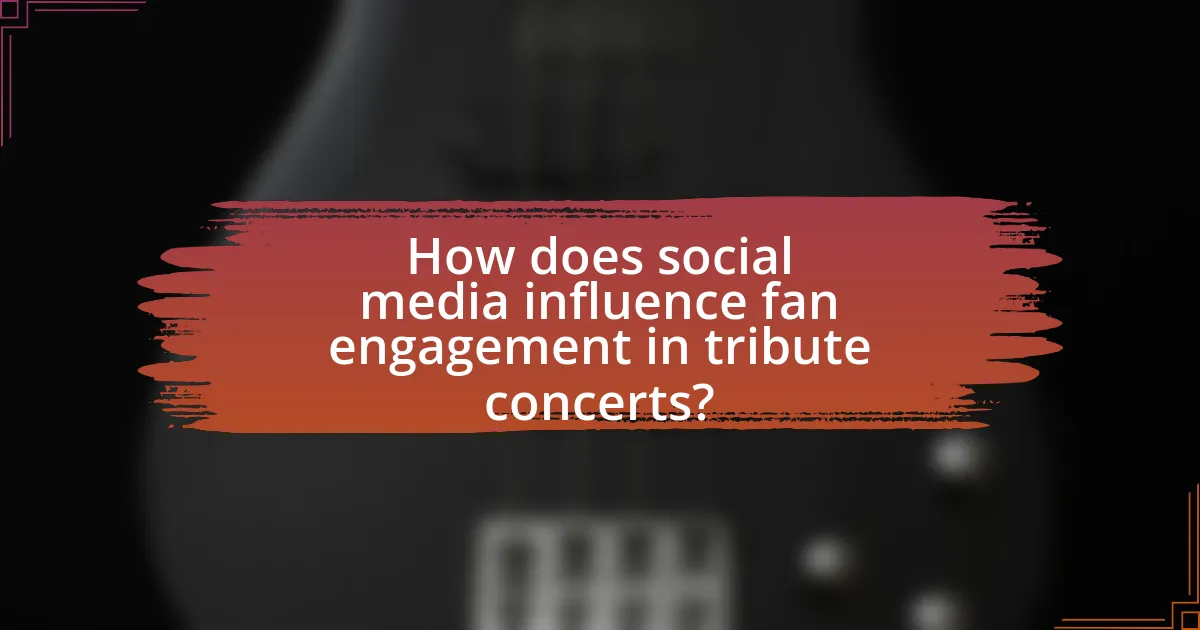
How does social media influence fan engagement in tribute concerts?
Social media significantly enhances fan engagement in tribute concerts by facilitating real-time interaction and community building among fans. Platforms like Facebook, Twitter, and Instagram allow fans to share their experiences, post photos, and express their emotions during and after the event, creating a sense of belonging and shared experience. According to a study by the Pew Research Center, 69% of adults in the U.S. use social media, which indicates a vast audience that can be reached and engaged through these platforms. Additionally, social media enables artists and organizers to promote events, share behind-the-scenes content, and interact directly with fans, further increasing engagement levels. This dynamic interaction not only amplifies the concert experience but also fosters a lasting connection between fans and the tribute being honored.
What role does social media play in promoting tribute concerts?
Social media plays a crucial role in promoting tribute concerts by enhancing visibility and engagement among fans. Platforms like Facebook, Instagram, and Twitter allow organizers to share event details, create buzz, and connect directly with potential attendees. For instance, a study by Eventbrite found that 93% of event organizers use social media for promotion, highlighting its effectiveness in reaching wider audiences. Additionally, social media facilitates real-time interaction, enabling fans to share their excitement and experiences, which can lead to increased ticket sales and attendance.
How do different social media platforms contribute to concert visibility?
Different social media platforms enhance concert visibility by facilitating real-time engagement, targeted advertising, and content sharing. For instance, platforms like Facebook and Instagram allow artists and promoters to create event pages, share promotional content, and engage directly with fans through comments and messages, which increases awareness and attendance. According to a study by Eventbrite, 62% of event organizers reported that social media is their most effective marketing tool, highlighting its role in reaching wider audiences. Additionally, Twitter’s trending topics can amplify concert announcements, while TikTok’s viral nature can generate buzz through user-generated content, further expanding visibility.
What strategies do organizers use on social media to attract fans?
Organizers use targeted content marketing, influencer partnerships, and interactive engagement strategies on social media to attract fans. Targeted content marketing involves creating tailored posts that resonate with specific audience segments, enhancing relatability and interest. Influencer partnerships leverage the reach and credibility of popular figures to promote events, effectively expanding the audience base. Interactive engagement strategies, such as polls, contests, and live Q&A sessions, foster a sense of community and encourage fan participation, which can lead to increased attendance and loyalty. These methods are supported by data indicating that social media campaigns with interactive elements can boost engagement rates by up to 50%.
How does social media enhance the fan experience during tribute concerts?
Social media enhances the fan experience during tribute concerts by facilitating real-time interaction and engagement among attendees and artists. Platforms like Twitter and Instagram allow fans to share their experiences, post live updates, and connect with others who share similar interests, creating a sense of community. For instance, a study by the Pew Research Center found that 69% of adults in the U.S. use social media, which indicates a broad audience that can engage with tribute concerts online. Additionally, social media enables fans to access exclusive content, such as behind-the-scenes footage and artist interactions, further enriching their experience. This immediate sharing and connectivity not only amplifies the emotional impact of the concert but also fosters a collective memory among fans, enhancing their overall enjoyment and connection to the event.
What interactive features do social media platforms offer for fans?
Social media platforms offer various interactive features for fans, including live streaming, polls, Q&A sessions, and comment sections. Live streaming allows fans to engage in real-time during events, enhancing their experience and connection with performers. Polls enable fans to express their preferences or opinions, fostering a sense of community and involvement. Q&A sessions provide opportunities for fans to ask questions directly to artists or organizers, creating a more personal interaction. Comment sections facilitate discussions among fans, allowing them to share thoughts and reactions instantly. These features collectively enhance fan engagement and participation in tribute concerts, making the experience more immersive and interactive.
How do fans use social media to share their concert experiences?
Fans use social media to share their concert experiences by posting photos, videos, and live updates during the event. This real-time sharing allows fans to engage with their followers and fellow concert-goers, creating a sense of community. According to a study by the Pew Research Center, 69% of adults in the U.S. use social media, which facilitates the rapid dissemination of concert experiences. Fans often use specific hashtags related to the concert or artist, making their posts easily discoverable and enhancing the collective experience. Additionally, platforms like Instagram and Twitter enable fans to interact directly with artists, further enriching their engagement.
What are the challenges of using social media for fan engagement in tribute concerts?
The challenges of using social media for fan engagement in tribute concerts include managing diverse audience expectations, ensuring effective communication, and addressing potential misinformation. Diverse audience expectations arise because fans may have varying interpretations of the tribute, leading to conflicting opinions and engagement levels. Effective communication is crucial, as social media platforms can limit message clarity and lead to misunderstandings. Additionally, misinformation can spread rapidly on social media, potentially damaging the reputation of the tribute concert and alienating fans. These challenges highlight the complexities of leveraging social media for meaningful fan engagement in tribute concerts.
How can negative feedback on social media impact concert attendance?
Negative feedback on social media can significantly reduce concert attendance by influencing public perception and creating a negative reputation for the event. When users share unfavorable opinions or experiences, potential attendees may be deterred from purchasing tickets, as they often rely on social proof from their peers. A study by the University of Pennsylvania found that 70% of consumers are influenced by online reviews, indicating that negative comments can lead to decreased interest and attendance. Additionally, if negative feedback goes viral, it can amplify the impact, leading to a broader audience being aware of the criticisms, further diminishing ticket sales.
What are the risks of misinformation on social media regarding tribute concerts?
Misinformation on social media regarding tribute concerts poses significant risks, including the potential for public confusion, misallocation of resources, and harm to the reputation of artists and organizers. Public confusion arises when false information about concert dates, locations, or performers circulates, leading fans to miss events or attend incorrect venues. Misallocation of resources can occur when fans invest time and money based on inaccurate details, resulting in financial losses and disappointment. Additionally, misinformation can damage the reputation of artists and organizers, as negative narratives can spread rapidly, affecting future events and fan trust. For instance, a study by the Pew Research Center found that 64% of Americans believe misinformation has caused confusion about important issues, highlighting the broader implications of false information in various contexts, including entertainment.
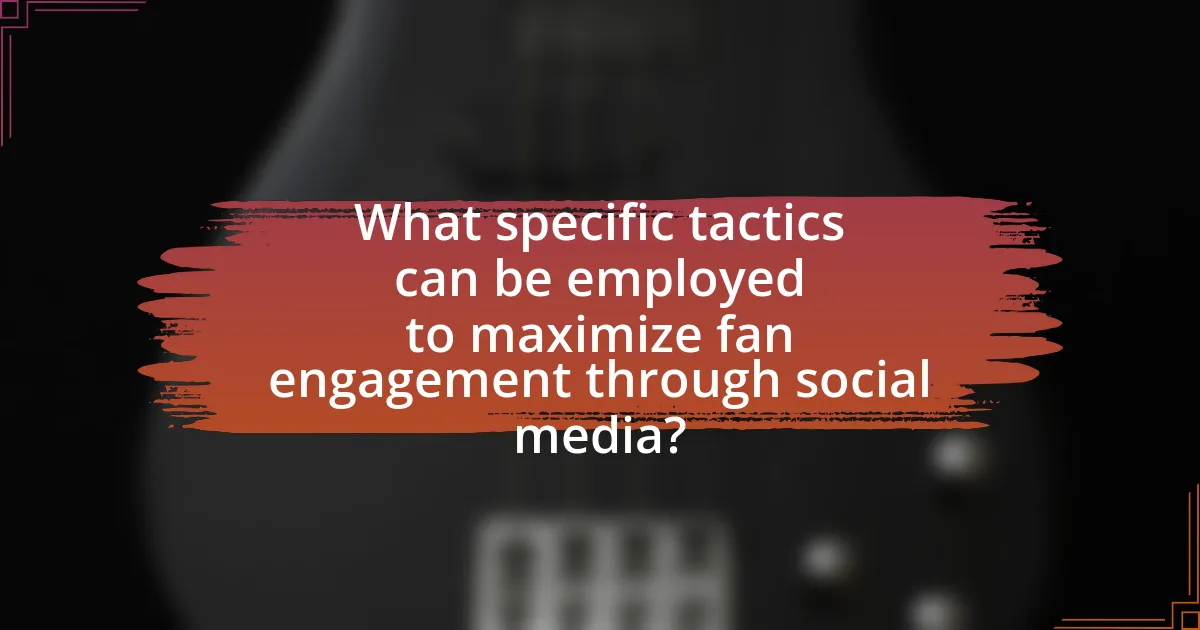
What specific tactics can be employed to maximize fan engagement through social media?
To maximize fan engagement through social media, organizations can employ tactics such as interactive content, live streaming events, and user-generated content campaigns. Interactive content, including polls and quizzes, encourages fans to participate actively, fostering a sense of community. Live streaming events, such as behind-the-scenes footage or Q&A sessions, create real-time connections between fans and artists, enhancing engagement. User-generated content campaigns, where fans share their experiences or creations related to the tribute concert, not only increase participation but also amplify reach through shares and tags. According to a study by Sprout Social, posts that encourage interaction can lead to a 200% increase in engagement rates, demonstrating the effectiveness of these tactics in enhancing fan involvement.
How can tribute concert organizers effectively use hashtags?
Tribute concert organizers can effectively use hashtags by creating unique, memorable tags that encapsulate the event’s theme and artist tribute. This approach enhances visibility and engagement on social media platforms, as users are more likely to search for and share content associated with specific hashtags. For instance, using a combination of the artist’s name and the concert’s location can attract both local fans and those interested in the artist’s legacy. Research indicates that posts with relevant hashtags can increase engagement by up to 12.6% on platforms like Instagram, demonstrating the effectiveness of strategic hashtag use in reaching a broader audience.
What are the best practices for creating engaging content on social media?
The best practices for creating engaging content on social media include understanding your audience, utilizing visuals, maintaining consistency, and encouraging interaction. Understanding your audience allows for tailored content that resonates, as studies show that personalized content increases engagement rates by up to 6 times. Utilizing visuals, such as images and videos, enhances user interaction, with posts containing visuals receiving 94% more views than text-only posts. Maintaining consistency in posting schedules helps build audience expectations and loyalty, as brands that post regularly see 67% more engagement. Encouraging interaction through questions, polls, and calls to action fosters community and dialogue, which is crucial for fan engagement, particularly in contexts like tribute concerts where emotional connections are significant.
How can live streaming enhance fan engagement during tribute concerts?
Live streaming enhances fan engagement during tribute concerts by allowing fans to participate in real-time, regardless of their physical location. This technology enables fans to experience the concert as if they were present, fostering a sense of community and shared experience. According to a study by the International Journal of Event Management Research, live streaming can increase audience reach by up to 300%, allowing more fans to connect with the event and each other through social media platforms. Additionally, interactive features such as live chats and polls during the stream further engage viewers, making them feel like active participants rather than passive observers.
What role do influencers play in promoting tribute concerts on social media?
Influencers play a crucial role in promoting tribute concerts on social media by leveraging their large followings to generate awareness and excitement. They create engaging content that highlights the concert’s significance, often sharing personal stories or connections to the artists being honored, which resonates with their audience. For instance, influencers can amplify event visibility through posts, stories, and live streams, reaching thousands or even millions of potential attendees. This strategy is supported by data showing that influencer marketing can yield up to 11 times higher return on investment compared to traditional advertising methods, making their involvement particularly effective in driving ticket sales and fan engagement for tribute concerts.
How can partnerships with influencers increase fan engagement?
Partnerships with influencers can significantly increase fan engagement by leveraging their established trust and reach within specific communities. Influencers create authentic connections with their followers, which can lead to higher interaction rates when they promote tribute concerts. For instance, a study by the Digital Marketing Institute found that 49% of consumers depend on influencer recommendations, indicating that fans are more likely to engage with content endorsed by influencers they admire. This engagement can manifest as increased social media interactions, ticket sales, and overall participation in events, thereby enhancing the overall experience of tribute concerts.
What are the potential downsides of relying on influencers for promotion?
Relying on influencers for promotion can lead to several potential downsides, including lack of authenticity, misalignment with brand values, and unpredictable ROI. Influencers may not genuinely connect with the promoted product, leading to a perception of inauthenticity among their followers, which can damage brand reputation. Additionally, if an influencer’s values do not align with those of the brand, it can result in negative backlash and alienation of the target audience. Furthermore, the return on investment from influencer marketing can be inconsistent, as engagement metrics do not always translate to sales, making it difficult for brands to measure the effectiveness of their campaigns.
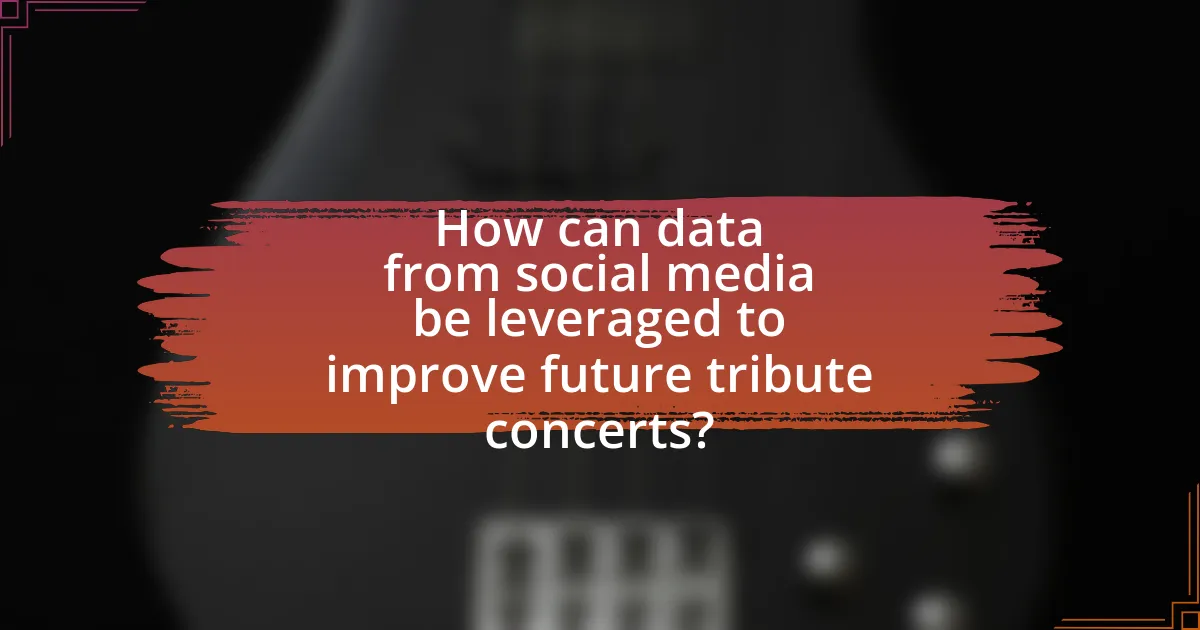
How can data from social media be leveraged to improve future tribute concerts?
Data from social media can be leveraged to improve future tribute concerts by analyzing audience engagement metrics, sentiment analysis, and feedback trends. By examining likes, shares, comments, and hashtags related to past tribute concerts, organizers can identify which artists, songs, and themes resonate most with fans. For instance, a study by the Pew Research Center found that 69% of adults use social media, providing a vast pool of data for understanding audience preferences. Additionally, sentiment analysis tools can quantify public opinion, allowing organizers to tailor concert experiences to match fan expectations. This data-driven approach can enhance marketing strategies, optimize setlists, and improve overall event planning, leading to more successful tribute concerts.
What metrics should organizers track to measure fan engagement on social media?
Organizers should track metrics such as engagement rate, reach, impressions, shares, comments, and follower growth to measure fan engagement on social media. Engagement rate, calculated as the total interactions (likes, comments, shares) divided by total followers, provides insight into how actively fans are participating with content. Reach indicates the number of unique users who see the posts, while impressions measure how many times the content is displayed, regardless of clicks. Shares and comments reflect the level of interaction and interest from fans, and follower growth shows the expanding audience base. These metrics collectively offer a comprehensive view of fan engagement, enabling organizers to assess the effectiveness of their social media strategies in the context of tribute concerts.
How can audience feedback on social media inform concert planning?
Audience feedback on social media can significantly inform concert planning by providing insights into fan preferences and expectations. Analyzing comments, likes, and shares related to past events allows organizers to identify popular artists, desired venues, and preferred dates. For instance, a study by the University of Southern California found that 70% of concertgoers rely on social media to discover events, indicating that feedback can guide marketing strategies and enhance audience reach. Additionally, real-time feedback during events can help organizers adjust logistics, such as setlists or crowd management, to improve overall attendee satisfaction.
What tools are available for analyzing social media engagement data?
Tools available for analyzing social media engagement data include Hootsuite, Sprout Social, and Google Analytics. Hootsuite provides comprehensive analytics for tracking engagement metrics across multiple platforms, allowing users to measure likes, shares, and comments effectively. Sprout Social offers in-depth reporting features that help analyze audience engagement and sentiment, providing insights into user interactions. Google Analytics can track social media traffic to websites, offering data on user behavior and engagement levels. These tools are widely used in the industry, demonstrating their effectiveness in measuring social media engagement.
What are the best practices for integrating social media insights into concert strategy?
The best practices for integrating social media insights into concert strategy include analyzing audience engagement metrics, leveraging user-generated content, and tailoring promotional efforts based on demographic data. Analyzing audience engagement metrics, such as likes, shares, and comments, helps identify which content resonates most with fans, allowing for more targeted marketing strategies. Leveraging user-generated content, such as fan photos and videos from previous concerts, fosters community and encourages further engagement. Tailoring promotional efforts based on demographic data, including age, location, and interests, ensures that marketing messages reach the most relevant audiences, enhancing ticket sales and overall concert success. These practices are supported by studies showing that targeted social media strategies can increase engagement rates by up to 50%.
How can organizers adapt their marketing strategies based on social media trends?
Organizers can adapt their marketing strategies based on social media trends by analyzing engagement metrics and audience preferences on platforms like Instagram, TikTok, and Twitter. By monitoring trending hashtags, popular content formats, and user interactions, organizers can tailor their promotional efforts to align with what resonates most with their target audience. For instance, if video content showcasing behind-the-scenes footage gains traction, organizers can create similar content to enhance fan engagement. Research indicates that 54% of social media users prefer video content, highlighting the importance of adapting to this trend for effective marketing.
What lessons can be learned from successful tribute concerts regarding social media use?
Successful tribute concerts demonstrate that effective social media use enhances fan engagement and broadens audience reach. By leveraging platforms like Twitter, Instagram, and Facebook, organizers can create buzz before, during, and after the event, leading to increased ticket sales and audience participation. For instance, the “The Concert for George” in 2002 utilized social media to connect fans and share live updates, resulting in significant online engagement and a wider audience. Additionally, successful tribute concerts often employ hashtags to facilitate conversation and community building among fans, which can lead to a more immersive experience. This strategic use of social media not only amplifies the event’s visibility but also fosters a sense of belonging among attendees, reinforcing the emotional connection to the tribute being celebrated.
What are some practical tips for enhancing fan engagement through social media at tribute concerts?
To enhance fan engagement through social media at tribute concerts, organizers should implement interactive content, such as live polls and Q&A sessions, to foster real-time participation. Engaging fans with behind-the-scenes content, including artist interviews and rehearsal footage, creates a sense of exclusivity and connection. Additionally, utilizing event-specific hashtags encourages fans to share their experiences and facilitates community building. According to a study by the Pew Research Center, 69% of adults in the U.S. use social media, indicating a broad audience that can be reached effectively through these platforms. Furthermore, posting user-generated content, such as fan photos and videos, not only showcases audience involvement but also strengthens the emotional bond between fans and the tribute event.
